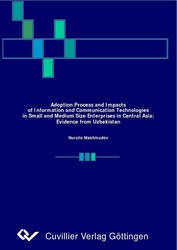| Areas | |
|---|---|
| Serie de libros (97) |
1381
|
| Nachhaltigkeit |
3
|
| Gesundheitswesen |
1
|
| Letra |
2369
|
| Medienwissenschaften | 16 |
| Teología | 57 |
| Filosofía | 102 |
| Derecho | 423 |
| Economía | 851 |
| Ciencias sociales | 417 |
| Ciencias del deporte | 48 |
| Psicología | 233 |
| Educación | 190 |
| Historia | 183 |
| Arte | 111 |
| Ciencias culturales | 166 |
| Literatur | 117 |
| Lingüística | 88 |
| Ciencias Naturales |
5408
|
| Ciencias Ingeniería |
1795
|
| General |
98
|
|
Leitlinien Unfallchirurgie
5. Auflage bestellen |
|
Erweiterte Suche
Adoption Process and Impacts of Information and Communication Technologies in Small and Medium Size Enterprises in Central Asia: Evidences from Uzbekistan (Tienda española)
Nurullo Makhmudov (Autor)Previo
Indice, Datei (16 KB)
Lectura de prueba, Datei (37 KB)
Artificial Neural Networks (NNs) possess a great potential for automatic classification: they can be trained to classify successfully noisy, incomplete, or inconsistent data. However, an automation degree of existing NNs is relatively low because of several limitations. Usually, NNs require manual configuration: a large number of tuning parameters and the need for choosing an appropriate network topology lead to lengthy experimental cycles performed to find the best settings for a certain classification task. Additionally, many NNs need retraining in respect to changing input data and therefore cannot learn automatically in non-stationary environments. Another disadvantage of NNs is their «black-box» nature: they are not suitable for verification or interpretation by humans. A low degree of automation prevents employment of NNs in many practical applications when the users cannot be involved in the training and classification processes. Therefore the initial goal of the presented research was to develop a neural classifier that would be well-suited for automation.
Für die Verwendung von künstlichen neuronalen Netzen als automatischen Klassifikatoren sprechen ihre Lernfähigkeit, Modellfreiheit und Nichtlinearität der Datenapproximation. Ein zusätzlicher Vorteil ist ihre Fähigkeit zur Verarbeitung unvollständiger, verrauschter oder inkonsistenter Information. Trotzdem beeinträchtigen drei wichtige Faktoren die Automatisierbarkeit neuronaler Algorithmen: die Konfiguration eines Netzes benötigt oft entweder viel Fachwissen und Erfahrung oder eine Phase zeitaufwändiger Parameteroptimierung; die neuronale Klassifikatoren zeigen ein sogenanntes «Black-Box»-Verhalten, d.h. das angelernte Wissen ist nicht interpretierbar. Außerdem sind nur wenige Algorithmen so stabil, dass sie in der Lage sind, in nicht stationären Anwendungen zu lernen.
| ISBN-10 (Impresion) | 3865370675 |
| ISBN-13 (Impresion) | 9783865370679 |
| ISBN-13 (E-Book) | 9783736910676 |
| Idioma | Alemán |
| Numero de paginas | 248 |
| Edicion | 1 Aufl. |
| Volumen | 0 |
| Lugar de publicacion | Göttingen |
| Lugar de la disertacion | Aachen |
| Fecha de publicacion | 22.04.2004 |
| Clasificacion simple | Tesis doctoral |
| Area |
Ciencias sociales
|








